Imagine holding a glass of water, thinking it’s pure and good for you. But in 2025, this water, like bottled water, might hide dangers. These dangers could harm your health and brain function.
As we face a growing crisis, a link between dementia and bottled water is becoming clear. Microplastics are getting into our brains in ways we can’t imagine. Studies show our brains have about a spoonful of microplastics. People with dementia may have even more, up to three to five times more than healthy people12.
Over the last eight years, microplastic levels in brain samples have increased by 50%. This is a scary fact that we must face. It shows how important it is to choose the water we drink carefully. The water we drink affects our future and the health of future generations more than we think.
Key Takeaways
- Dementia may be linked to the consumption of bottled water due to microplastics.
- Human brains hold about a spoonful of microplastics, with higher levels in dementia patients.
- Microplastic concentration has risen significantly in just eight years.
- Switching from bottled to tap water can greatly reduce microplastic intake.
- Bottled water is a major source of microplastics, second only to air pollutants.
Understanding Dementia: An Overview
Dementia is a group of symptoms caused by brain disorders. It affects memory, thinking, and social skills. Alzheimer’s disease is the most common type, changing family lives worldwide.
Knowing about dementia’s types and how they progress is crucial. This knowledge helps in finding ways to prevent and treat it. Recent studies show a rise in dementia cases, making research and awareness more important than ever. A study with over 73,000 patients with dementia shows how big a health issue it is3.
As people get older, they face more cognitive problems. Research into what causes these issues is key. Studies have found that even small amounts of lithium in water might help prevent dementia4. This could lead to big improvements in fighting dementia.
What is Battled Water?
Battled water is water sold in plastic bottles for easy drinking. Every year, about 600 billion plastic bottles are made. This makes bottled water a common choice for many looking for convenience5. But, it also raises big concerns about plastic pollution.
Research shows that plastic can leak from these bottles. A 2023 study by Columbia University found that a liter of bottled water can have around 240,000 tiny pieces of plastic5. These tiny plastics, smaller than a human hair, can be harmful if we eat them6.
Studies found many nanoparticles in bottled water, from 110,000 to 370,000 per liter. Most of these are tiny plastics6. The harm they can cause is still not fully understood but is a worry.
Drinking bottled water can have long-term effects, as these plastics don’t break down easily. They add to the plastic pollution in our environment6. Knowing about battled water helps us make better choices about our water and health.
The Rise of Microplastics in Our Lives
Microplastics are tiny pieces of plastic, smaller than five millimeters. They come from breaking down larger plastic items. These particles are found in air, water, and food, causing a lot of pollution and harm to our environment.
Studies show that people with dementia have much more microplastics in their brains. They have three to five times more than those without dementia7. In fact, brain samples from dementia patients have up to ten times more microplastics than those without the disease8.
Over eight years, the amount of microplastics in our brains has grown by over 50%9. This rise is linked to more plastic waste in our environment. Microplastics are found in many everyday items, like water bottles and food products8.
Research suggests that microplastics might block blood flow in the brain, like strokes9. They are also small enough to cross the placenta, posing risks to unborn babies9.

The Alarming Connection: Microplastics and Brain Health
Recent studies have found a link between microplastics and brain health, including dementia. Microplastics have been found in human brains, with high levels in dementia patients.
Microplastics Found in Human Brains
Research shows microplastics are more common in brain tissue than in other organs like the liver or kidneys10. Brains of people with dementia had up to ten times more microplastics than those without10. The most common type of microplastic found was polyethylene10.
This raises questions about how these particles get into brain tissues, possibly in fat cells within the myelin sheath10.
Study Findings on Dementia and Microplastics
Studies have found a worrying link between microplastics in brains and dementia1110. Over the last eight years, microplastic levels in brain tissue have increased by 50%10. This suggests a growing threat.
The connection between microplastics and neurodegenerative diseases is still being studied. Some research suggests they might be linked to memory loss and other cognitive problems11.
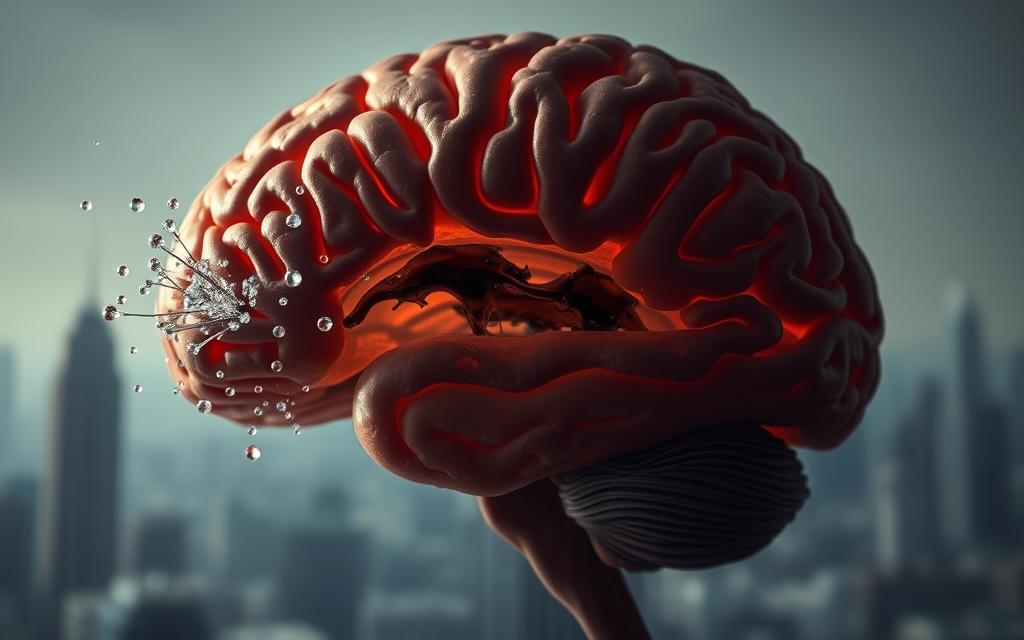
How Bottled Water Contributes to Microplastic Consumption
Bottled water is a big problem for microplastic consumption. Many people don’t know the dangers it poses. Switching to tap water can greatly reduce microplastic intake.
Studies show a big drop from 90,000 particles a year to just 4,00012. Bottled water contains a lot of microplastics, with 240,000 tiny plastic pieces in just one liter13. Most of these are nanoplastics, which are very small and dangerous13.
The Hidden Dangers of Bottled Water
Many think bottled water is safer than tap water. But, it can actually be more dangerous. Bottled water can pick up microplastics from the container itself.
Seven common plastics are found in bottled water, with nylon and PET being the most common13. Bottled water is now a major source of microplastics, second only to air pollution14. This makes it important to think about the health risks of drinking bottled water.
Comparative Analysis of Tap Water vs. Bottled Water
Tap water and bottled water have different levels of microplastic exposure. People who drink bottled water face levels of microplastics almost as high as all other sources combined12. Research also shows that people with dementia have microplastics in their brains at levels three to five times higher than those without14.
This shows why it’s crucial to consider switching to tap water for drinking.
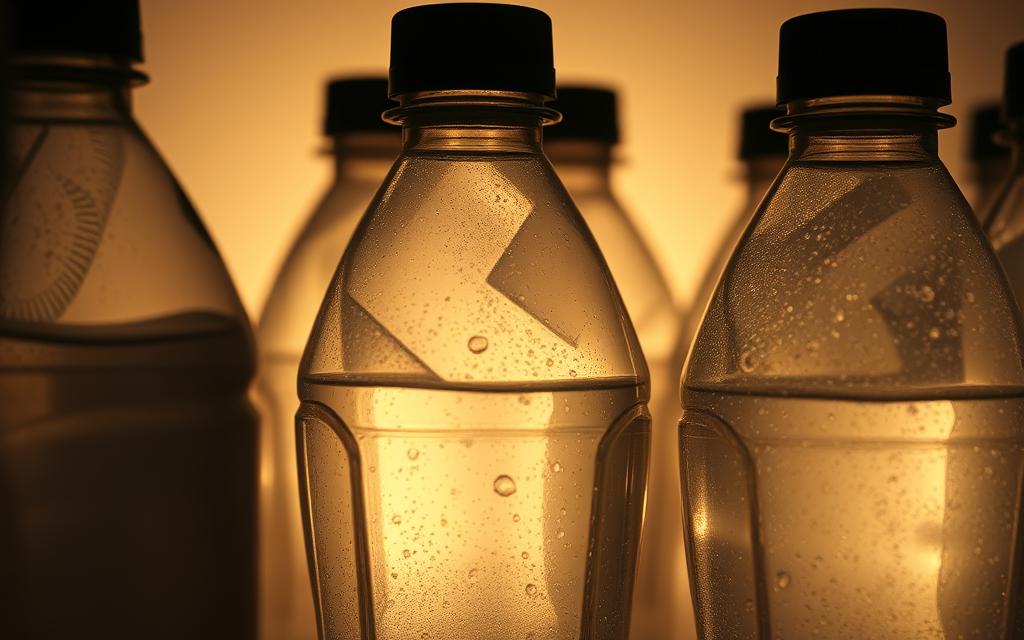
Dementia and Battled Water: What Research Reveals
Recent studies show a worrying link between dementia and microplastics in bottled water. People with dementia have up to 10 times more microplastics in their brains than those without15. This finding is alarming, as bottled water often contains harmful microplastic particles.
It’s important to understand how these particles affect our brains. This is because we all consume a lot of microplastics every year. On average, we take in 78,000 to 211,000 particles annually15. This is a big concern, as microplastics are everywhere in our environment.
Research shows that our brains have much higher levels of microplastics than other organs. This is a worrying trend that needs more study15. We must look into how bottled water affects our health, and the risks it poses, specially for those at risk of dementia.
Hydration’s Role in Cognitive Function
Keeping your body hydrated is key for better brain function and health. Water makes up about 50-70% of our body weight. It helps our brain work by delivering nutrients and removing waste.
The Importance of Staying Hydrated
Even a small amount of dehydration can hurt our thinking skills. Most people drink about 1L of water a day, but we need more, around 2L. A study with 1957 adults aged 55–75 found that 56% were dehydrated. This linked to a drop in brain function over two years1617.
Those who drank more water, from less than 1.2L to 2.5L, felt better and thought clearer.
How Hydration Affects Mental Health
Drinking enough water is linked to better mental health. Dehydration can lead to poor mood, tiredness, and trouble focusing. A study showed that people who drank less water believed it affected their thinking1617.
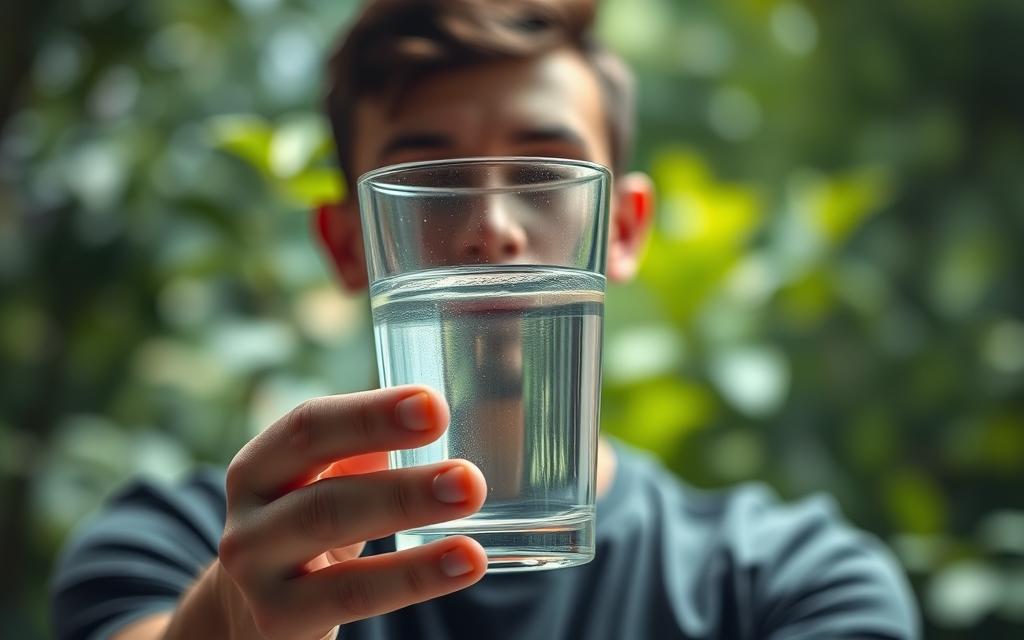
The Consequences of Microplastic Consumption
Microplastic consumption is becoming a big health concern. It’s linked to neurodegenerative diseases like Alzheimer’s. These tiny particles might even get into our brains, affecting our thinking abilities.
Implications for Neurodegenerative Diseases
Studies reveal that our brains can hold about a spoonful of microplastics and nanoplastics (MNPs)18. People with dementia have 3-5 times more MNPs in their brains18. Brain tissues have more MNPs than other organs, like the liver or kidney18.
From 2016 to 2024, research found a big jump in microplastics in brain tissues. Those with dementia had up to 10 times more microplastics than others19. In 2024, brain tissue samples had 4917 micrograms of microplastics per gram, a big increase from 3345 micrograms per gram in 201619.
Switching to filtered tap water can cut down microplastic intake a lot. It goes from 90,000 particles a year to just 4,00018. Bottled water can expose us to almost as many microplastic particles as all other sources combined19. Even heating food in plastic containers can release billions of plastic particles into our meals19. We need to find out how much microplastic is safe and what long-term effects it has on our bodies18.
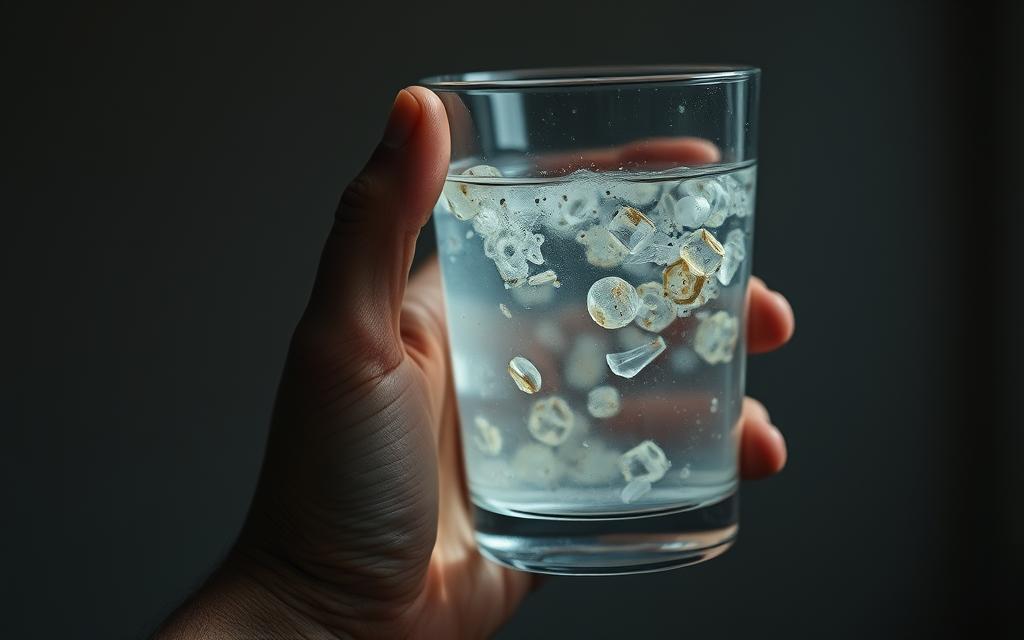
Environmental Impact of Plastic Pollution
Plastic pollution is a big problem that affects our planet in many ways. It can be found everywhere, from the highest mountains to the deepest oceans. This pollution harms both public health and ecosystems.
Microplastics, tiny pieces of plastic, have even entered human bodies. This shows how widespread the problem is20. These tiny plastics can cause long-term inflammation in our bodies, leading to various health issues20.
In nature, plastic pollution has severe effects. Animals can eat microplastics, which disrupts food chains and threatens biodiversity. This also means contaminated animals can end up in our food, posing health risks. People living in cities are more likely to get diseases like Alzheimer’s, linked to pollution21.
Even small particles, like metal debris in cities, have not been fully studied. Yet, they might be linked to serious diseases21.
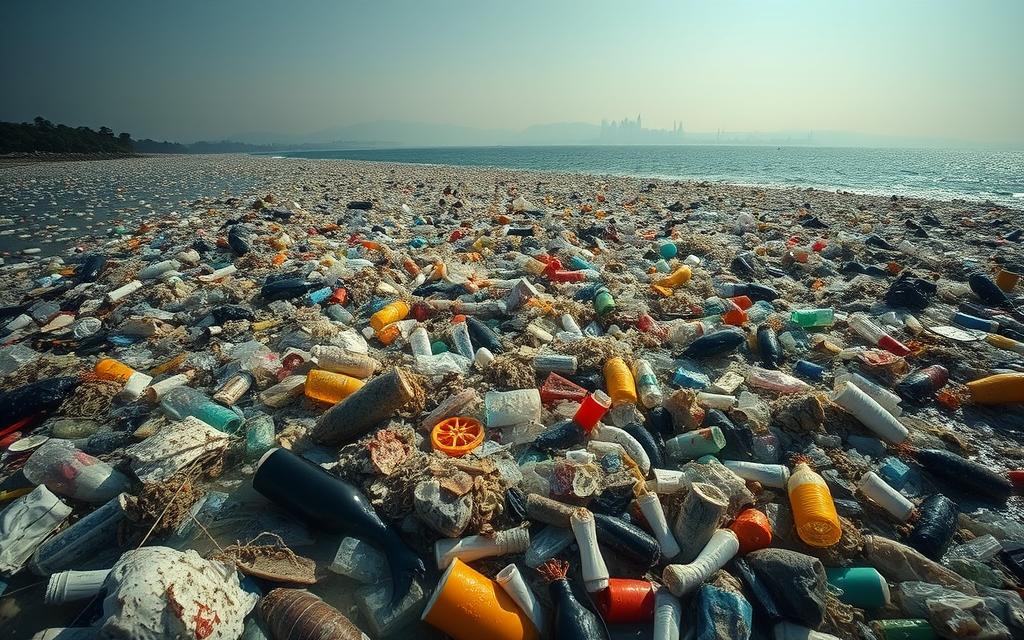
To fight microplastic pollution in water, we need better filters. Regular water treatment might not remove all harmful particles safely21. We must also educate people and improve environmental laws to protect our health and nature2021.
Strategies to Reduce Microplastic Exposure
It’s important to cut down on microplastic exposure for our health. One good move is to switch from bottled water to tap water. Studies show this change can cut down microplastic intake from 90,000 particles a year to 4,00022. Bottled water is a big source of microplastics, making tap water a better choice.
Switching from Bottled Water to Tap Water
Drinking tap water not only lowers microplastic intake but also boosts health. Tap water is safer than bottled water when it comes to microplastics. It’s also cheaper and more convenient, making it a smart choice for many.
Choosing tap water is key since microplastic emissions to the environment are huge, estimated at 10 to 40 million tonnes a year22.
Choosing Plastic-Free Solutions in Daily Life
Using plastic-free items in our daily lives can greatly reduce microplastic exposure. We can use reusable bags, glass containers, and products from natural materials. It’s important to know where microplastics come from, like in processed foods and disposable items.
By picking products without plastic, we help the environment and lower our microplastic footprint.

Choosing plastic-free options leads to a healthier lifestyle and less harm from microplastics.
| Strategy | Benefit | Example |
|---|---|---|
| Switch to Tap Water | Reduces microplastic intake by up to 86% | Use home filtration systems |
| Adopt Reusable Products | Cuts down on plastic waste and microplastic production | Reusable shopping bags, glass containers |
| Avoid Processed Foods | Minimizes exposure to microplastics in food | Choose fresh produce over packaged items |
These steps are crucial for reducing microplastic exposure and making healthier choices.
The Future of Water Safety and Health
Innovations aimed at improving water safety are key in fighting plastic pollution and boosting public health. New technologies are being developed to replace old plastics with ones that last longer and break down faster. These advancements also make water filtration systems better.
Getting safe drinking water is a big issue worldwide. About 785 million people lack access to clean water, which is about 1 in 10 people globally23. Investing in better water systems is crucial. For example, the American Jobs Plan puts $111 billion into improving water infrastructure23.
Innovations to Combat Plastic Pollution
New water treatment technologies offer big chances for improvement. For instance, reverse osmosis systems can remove harmful substances like aluminum from water. This makes the water safer to drink24.
These innovations help not just by making water safer but also by cutting down on microplastics. This is a big step in solving the plastic pollution problem.

Communities need to support these new technologies and push for stronger water safety laws. Working together, we can lower the risks of unsafe water and spread the word about living sustainably.
| Innovation | Function | Impact on Water Quality |
|---|---|---|
| Reverse Osmosis Systems | Removes contaminants including aluminum | Reduces health risks associated with waterborne diseases |
| Biodegradable Plastics | Substitutes for traditional plastics | Minimizes plastic pollution in water sources |
| Advanced Filtration Methods | Enhanced water purification | Improves safety and taste of drinking water |
As we keep working on solving plastic pollution, keeping water safety in focus is essential. These creative solutions can lead to a future where everyone has access to clean water. This will greatly reduce water-related health problems25.
Personal Action: Empowering Change
Personal action is key in fighting the growing problem of plastic use and its health risks. People can make a big difference by joining local and national advocacy efforts. Getting involved in community projects helps us feel united and strengthens our voices in talks about sustainability and health.
Advocating for Better Policies
To make real change, we need informed citizens who are ready to challenge old ways and push for better ones. This means supporting laws that cut down on plastic and backing companies that care for the planet. By spreading the word and pushing for laws that reduce plastic, we can help make our world a healthier place.

Conclusion
The link between dementia and battled water is alarming. Studies show microplastics in human brains are 50% higher in dementia patients than in healthy people26. With 10 million new dementia cases yearly, it’s crucial to understand plastic’s impact27.
Research highlights the dangers of microplastics and their effect on our brains. We need to take action to reduce exposure. This means choosing safer drinking options and pushing for cleaner water policies. The cost of dementia is expected to hit $2.6 trillion by 2030, making action urgent27.
Creating awareness about battled water and microplastics is key to better health. We must keep researching and push for policy changes. This will help protect our future generations from these threats28.
FAQ
What is dementia, and how does it affect cognitive function?
Dementia is a term for brain disorders that affect memory and thinking. It leads to confusion and memory loss. Alzheimer’s disease is the most common type.
How does bottled water relate to microplastic consumption?
Bottled water can contain microplastics from plastic containers. This poses health risks, mainly for those at risk for neurodegenerative diseases.
What are microplastics, and how do they impact health?
Microplastics are small plastic pieces from broken-down items. They are found in air, water, and food. Research suggests they might harm health, including diseases like dementia and Alzheimer’s.
What does research say about the levels of microplastics in individuals with dementia?
Studies show people with dementia have more microplastics in their brains. Their brain tissues have 7 to 30 times more microplastics than other organs. This is a big concern for brain health.
How important is hydration for cognitive function and brain health?
Drinking enough water is crucial for brain health. It helps with brain functions and nutrient delivery. Even a little dehydration can harm mood and thinking skills.
What steps can I take to reduce my exposure to microplastics?
To reduce microplastic exposure, use tap water instead of bottled. Choose plastic-free options like reusable containers. Knowing where microplastics come from helps make better choices for health.
What future innovations are being explored to combat plastic pollution?
Scientists are working on biodegradable plastics and better water filters. These efforts aim to cut down microplastics in our water, improving health and safety.
How does plastic pollution affect ecosystems and human health?
Plastic pollution harms ecosystems and wildlife. It contaminates food and water, affecting human health. We need sustainable practices and policies to fight this.
Source Links
- Dementia-link to bottled water as brains contain spoon of plastic – https://www.getsurrey.co.uk/news/health/dementia-link-bottled-water-human-31202457
- Bottled water dementia link as teaspoon of plastic found in brain – https://www.mirror.co.uk/news/health/bottled-water-dementia-link-humans-34870229
- Association of Lithium in Drinking Water With the Incidence of Dementia – https://pmc.ncbi.nlm.nih.gov/articles/PMC5710473/
- Trace lithium levels in drinking water and risk of dementia: a systematic review – International Journal of Bipolar Disorders – https://journalbipolardisorders.springeropen.com/articles/10.1186/s40345-024-00348-5
- Research links plastic bottles to raised blood pressure, increasing risk of heart attacks, strokes, dementia, and cancer – https://www.bluewatergroup.com/en-us/blog/research-links-plastic-bottles-to-raised-blood-pressure-increasing-risk-of-heart-attacks-strokes-dementia-and-cancer-3336851?srsltid=AfmBOoo8j78REyBvOQegxwSIl-NsI50Ewo46lJ85116GJ5VODUW-ZGIc
- Bottled water contains alarming amount of nanoplastics: What to know – https://www.medicalnewstoday.com/articles/are-plastic-particles-in-bottled-water-harmful-to-health
- Scientists detect higher microplastic levels in brains linked to dementia – https://www.tucsonsentinel.com/nationworld/report/030625_human_microplastics/
- Microplastics May Increase Your Chance Of Dementia. Experts Say You Can Stay Safe With These Tips. – https://www.womenshealthmag.com/health/a64146986/dementia-microplastics-brain-study/
- Study suggests high levels of microplastics in the human brain from everyday items – https://www.fox13news.com/news/study-suggests-high-levels-microplastics-human-brain-from-everyday-items
- UNM Researchers Find Alarmingly High Levels of Microplastics in Human Brains – and Concentrations are Growing Over Time – https://hscnews.unm.edu/news/hsc-newsroom-post-microplastics-human-brains
- Scientists make stunning discovery about health impacts of quitting drinking bottled water — here’s what they found – https://www.yahoo.com/news/scientists-stunning-discovery-health-impacts-104539483.html
- This is Your Brain on Microplastics: Scientists Warn of Alarming Rise in Brain Microplastic Levels – https://thedebrief.org/this-is-your-brain-on-microplastics-scientists-warn-of-alarming-rise-in-brain-microplastic-levels/
- Plastic particles in bottled water – https://www.nih.gov/news-events/nih-research-matters/plastic-particles-bottled-water
- Bottled water dementia link as brains contain spoon of plastic – https://www.gloucestershirelive.co.uk/news/health/dementia-link-bottled-water-human-10025605?int_source=mantis_rec_top&int_medium=web&int_campaign=more_like_this_top
- More microplastics in brain than other organs: What does it mean? – https://www.medicalnewstoday.com/articles/dementia-are-microplastics-accumulating-in-our-brains-a-risk-factor
- Levels of Hydration and Cognitive Function – https://www.news-medical.net/health/Levels-of-Hydration-and-Cognitive-Function.aspx
- Water intake, hydration status and 2-year changes in cognitive performance: a prospective cohort study – https://pmc.ncbi.nlm.nih.gov/articles/PMC9993798/
- Alarming levels of microplastics discovered in human brain tissue, linked to dementia – https://www.eurekalert.org/news-releases/1074296
- Scientists issue dire warning: Microplastic accumulation in human brains escalating – https://www.psypost.org/scientists-issue-dire-warning-microplastic-accumulation-in-human-brains-escalating/
- Can plastic harm the brain? | Cognitive Vitality – https://www.alzdiscovery.org/cognitive-vitality/blog/can-plastic-harm-the-brain
- Brain Toxins, Dementia and the Tap Water Dilemma- Neurological Associates – https://www.neurologysantamonica.com/brain-toxins-dementia-and-the-tap-water-dilemma/
- Microplastics: 5 ways to reduce exposure – https://www.medicalnewstoday.com/articles/microplastics-in-the-brain-how-can-we-avoid-exposure
- The impact of water poverty in the United States – https://www.medicalnewstoday.com/articles/how-water-poverty-impacts-public-health-in-the-us
- The Risks of Aluminum and Silica in Drinking Water | Atlantic Blue Water Center – https://atlanticbluewatercenter.com/the-risks-of-aluminum-and-silica-in-drinking-water/
- Over 50% of the world fears drinking water harm – https://www.news-medical.net/news/20240829/Over-5025-of-the-world-fears-drinking-water-harm.aspx
- Is this proof that plastic bottles could trigger dementia? – https://www.dailymail.co.uk/health/article-14355261/Plastic-water-bottles-INSIDE-human-brains-dementia.html
- Association between the Composition of Drinking Water and Cognitive Function in the Elderly: A Systematic Review – https://pmc.ncbi.nlm.nih.gov/articles/PMC10969896/
- Water and Alzheimer’s disease and other aging effects – https://www.freedrinkingwater.com/blogs/water-health/26-water-alzheimers-disease-age-effects
